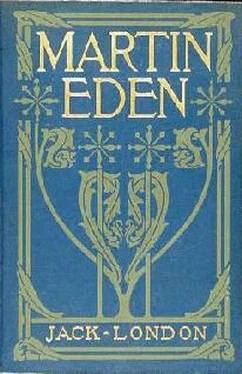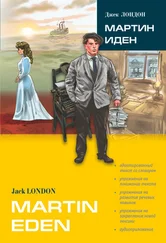"You fool!" he cried at his image in the looking-glass. "You wanted to write, and you tried to write, and you had nothing in you to write about. What did you have in you?-some childish notions, a few half-baked sentiments, a lot of undigested beauty, a great black mass of ignorance, a heart filled to bursting with love, and an ambition as big as your love and as futile as your ignorance. And you wanted to write! Why, you’re just on the edge of beginning to get something in you to write about. You wanted to create beauty, but how could you when you knew nothing about the nature of beauty? You wanted to write about life when you knew nothing of the essential characteristics of life. You wanted to write about the world and the scheme of existence when the world was a Chinese puzzle to you and all that you could have written would have been about what you did not know of the scheme of existence. But cheer up, Martin, my boy. You’ll write yet. You know a little, a very little, and you’re on the right road now to know more. Some day, if you’re lucky, you may come pretty close to knowing all that may be known. Then you will write."
He brought his great discovery to Ruth, sharing with her all his joy and wonder in it. But she did not seem to be so enthusiastic over it. She tacitly accepted it and, in a way, seemed aware of it from her own studies. It did not stir her deeply, as it did him, and he would have been surprised had he not reasoned it out that it was not new and fresh to her as it was to him. Arthur and Norman, he found, believed in evolution and had read Spencer, though it did not seem to have made any vital impression upon them, while the young fellow with the glasses and the mop of hair, Will Olney, sneered disagreeably at Spencer and repeated the epigram, "There is no god but the Unknowable, and Herbert Spencer is his prophet."
But Martin forgave him the sneer, for he had begun to discover that Olney was not in love with Ruth. Later, he was dumfounded to learn from various little happenings not only that Olney did not care for Ruth, but that he had a positive dislike for her. Martin could not understand this. It was a bit of phenomena that he could not correlate with all the rest of the phenomena in the universe. But nevertheless he felt sorry for the young fellow because of the great lack in his nature that prevented him from a proper appreciation of Ruth’s fineness and beauty. They rode out into the hills several Sundays on their wheels, and Martin had ample opportunity to observe the armed truce that existed between Ruth and Olney. The latter chummed with Norman, throwing Arthur and Martin into company with Ruth, for which Martin was duly grateful.
Those Sundays were great days for Martin, greatest because he was with Ruth, and great, also, because they were putting him more on a par with the young men of her class. In spite of their long years of disciplined education, he was finding himself their intellectual equal, and the hours spent with them in conversation was so much practice for him in the use of the grammar he had studied so hard. He had abandoned the etiquette books, falling back upon observation to show him the right things to do. Except when carried away by his enthusiasm, he was always on guard, keenly watchful of their actions and learning their little courtesies and refinements of conduct.
The fact that Spencer was very little read was for some time a source of surprise to Martin. "Herbert Spencer," said the man at the desk in the library, "oh, yes, a great mind." But the man did not seem to know anything of the content of that great mind. One evening, at dinner, when Mr. Butler was there, Martin turned the conversation upon Spencer. Mr. Morse bitterly arraigned the English philosopher’s agnosticism, but confessed that he had not read "First Principles"; while Mr. Butler stated that he had no patience with Spencer, had never read a line of him, and had managed to get along quite well without him. Doubts arose in Martin’s mind, and had he been less strongly individual he would have accepted the general opinion and given Herbert Spencer up. As it was, he found Spencer’s explanation of things convincing; and, as he phrased it to himself, to give up Spencer would be equivalent to a navigator throwing the compass and chronometer overboard. So Martin went on into a thorough study of evolution, mastering more and more the subject himself, and being convinced by the corroborative testimony of a thousand independent writers. The more he studied, the more vistas he caught of fields of knowledge yet unexplored, and the regret that days were only twenty-four hours long became a chronic complaint with him.
One day, because the days were so short, he decided to give up algebra and geometry. Trigonometry he had not even attempted. Then he cut chemistry from his study-list, retaining only physics.
"I am not a specialist," he said, in defence, to Ruth. "Nor am I going to try to be a specialist. There are too many special fields for any one man, in a whole lifetime, to master a tithe of them. I must pursue general knowledge. When I need the work of specialists, I shall refer to their books."
"But that is not like having the knowledge yourself," she protested.
"But it is unnecessary to have it. We profit from the work of the specialists. That’s what they are for. When I came in, I noticed the chimney-sweeps at work. They’re specialists, and when they get done, you will enjoy clean chimneys without knowing anything about the construction of chimneys."
"That’s far-fetched, I am afraid."
She looked at him curiously, and he felt a reproach in her gaze and manner. But he was convinced of the rightness of his position.
"All thinkers on general subjects, the greatest minds in the world, in fact, rely on the specialists. Herbert Spencer did that. He generalized upon the findings of thousands of investigators. He would have had to live a thousand lives in order to do it all himself. And so with Darwin. He took advantage of all that had been learned by the florists and cattle-breeders."
"You’re right, Martin," Olney said. "You know what you’re after, and Ruth doesn’t. She doesn’t know what she is after for herself even."
"– Oh, yes," Olney rushed on, heading off her objection, "I know you call it general culture. But it doesn’t matter what you study if you want general culture. You can study French, or you can study German, or cut them both out and study Esperanto, you’ll get the culture tone just the same. You can study Greek or Latin, too, for the same purpose, though it will never be any use to you. It will be culture, though. Why, Ruth studied Saxon, became clever in it,-that was two years ago,-and all that she remembers of it now is ‘Whan that sweet Aprile with his schowers soote’-isn’t that the way it goes?"
"But it’s given you the culture tone just the same," he laughed, again heading her off. "I know. We were in the same classes."
"But you speak of culture as if it should be a means to something," Ruth cried out. Her eyes were flashing, and in her cheeks were two spots of color. "Culture is the end in itself."
"But that is not what Martin wants."
"How do you know?"
"What do you want, Martin?" Olney demanded, turning squarely upon him.
Martin felt very uncomfortable, and looked entreaty at Ruth.
"Yes, what do you want?" Ruth asked. "That will settle it."
"Yes, of course, I want culture," Martin faltered. "I love beauty, and culture will give me a finer and keener appreciation of beauty."
She nodded her head and looked triumph.
"Rot, and you know it," was Olney’s comment. "Martin’s after career, not culture. It just happens that culture, in his case, is incidental to career. If he wanted to be a chemist, culture would be unnecessary. Martin wants to write, but he’s afraid to say so because it will put you in the wrong."
Читать дальше












